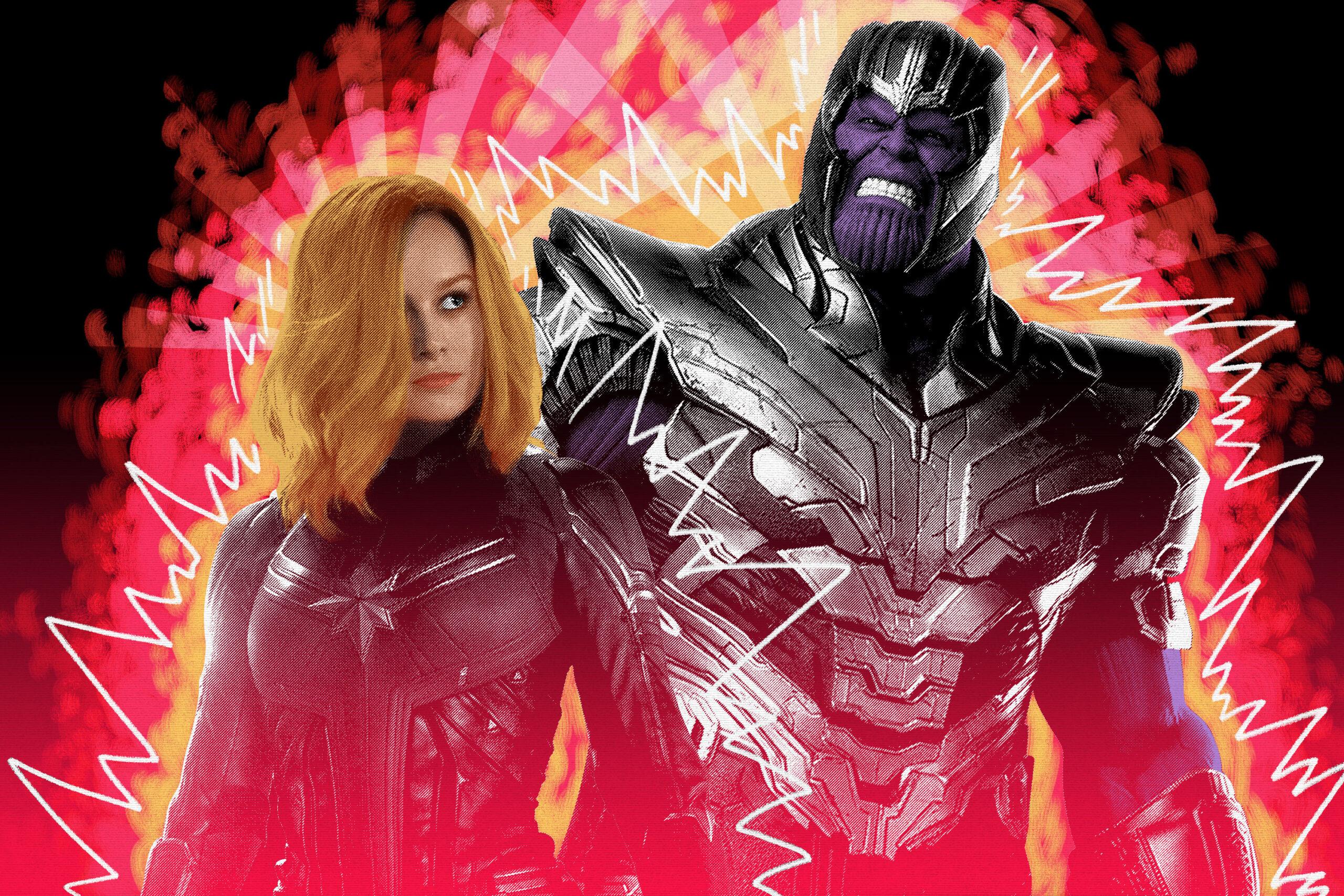
Anticipation for Captain Marvel as the key to defeating Thanos began with a tease. In the post-credits stinger for Avengers: Infinity War, released a year ago this weekend, Samuel L. Jackson’s Nick Fury, moments from being disappeared by the villain’s universe-cleaving snap, uses a pager to summon a new ally.
The Marvel fandom immediately wondered how Captain Marvel might swing the tide against the Mad Titan, and why the MCU had kept that hero in reserve for so many movies until this crucial moment. Her powers were analyzed, the comics consulted, any and all clues about her impending appearance consumed, all with the endgame (sorry) of discerning how she might match up against Thanos, and what advantages she might bring above and beyond every other MCU hero.
And then Captain Marvel’s titular film reached theaters last month, and then she swallowed the powers of an Infinity Stone, and then she tore through multiple advanced-tech spaceships in the time it takes Spider-Man to swing from one building to another. Then she began appearing in the Avengers: Endgame preview material, telling the non-snapped Avengers that the difference from one movie to the next was that “before, you didn’t have me.” Captain Marvel became less a tease than an obvious route to victory. As Amanda Dobbins wrote in The Ringer’s exit survey for that hero’s movie, “So … she’s undefeatable?”
It’s not entirely clear, even after Marvel spent two-plus hours offering fans a backstory to the character in direct advance of Endgame. But that’s not a knock on Captain Marvel, a satisfying if not spectacular movie of the same merit as other character-introduction installments in the MCU. It’s a quality of the entire 22-movie (and counting) franchise, which still struggles to place character powers and limitations on a coherent scale. The heroes’ abilities are generally apparent, but those abilities’ strength and extent vary as the plot demands.
Sometimes Captain America can bear the brunt of Thanos’s fist (at least for a short while); other times he struggles to defeat a non-superpowered human enemy. This problem extends to the franchise’s powerful weapons, too. Sometimes, the Power Stone is used to raze planets or transform a planet’s moon into a projectile; other times, it merely knocks people down where they stand.
This issue is of particular relevance as Endgame approaches, pitting the half of the heroes Thanos didn’t rapture against the most powerful villain the franchise has created and bringing 11 years of rising action to a close. This next movie will be longer than three hours; it would be nice to know how, exactly, the heroes and villain shape up over that duration.
But if Infinity War is any indication, that narrative dream probably won’t come to fruition. Thanos is so innately powerful that when he possesses a single stone, he beats both Thor and the Hulk to a pulp—the latter so severely that Bruce Banner can’t coax the green guy into battle for the rest of the movie. When Thanos possesses two stones, Banner calls him the “strongest creature in the universe.” And when Gamora opines that if Thanos obtains a third stone, “He’ll be impossible to stop,” Thor responds, “He already is.”
Yet later in Infinity War, Thor nearly defeats a six-stoned Thanos with his shiny new ax. Does that mean the ax adds the power equivalent of five stones, such that it places Thor and Thanos on roughly equal footing? Once again, it’s not clear.
Some obvious hierarchies appear naturally among MCU characters. In a 2016 piece in advance of Captain America: Civil War, FiveThirtyEight created a ranking of Earth’s heroes by polling viewers on who would win in hypothetical one-on-one fights, and a few general tiers emerged: Thor, Vision, and Hulk at the top; War Machine, Hawkeye, and Falcon at the bottom; etc. But beyond those groupings, little clarity has emerged from the stories themselves.
Two factors would seem to cause this storytelling dilemma. The first is the characters’ sheer power, which is inherently beyond human capabilities and thus, in some cases, beyond human understanding as well. The old Arthur C. Clarke line comes to mind: “Any sufficiently advanced technology is indistinguishable from magic.” In this case, any sufficiently superpowered hero or villain is indistinguishable from another. It’s easy to convey the difference between someone with regular abilities and someone who’s 50 percent stronger; it’s much harder to convey the difference between someone who’s 500 percent stronger and someone who’s 550 percent stronger. At some point, the entire horizon looks the same.
The second factor is escalation over the course of the MCU timeline. The delight of the interstitial films like Spider-Man: Homecoming and the two Ant-Man capers is their relatively smaller scale and stakes. In the tentpoles with an Avengers: Colon title, however, the stakes only rise. The first climaxes with a threat to New York, the second to the planet Earth, the third and fourth to the entire universe of creatures.
Along with this increase in stakes comes an increase in character power. This is true of both familiar characters—the current iteration of Iron Man could beat the first film’s version in the time it would take the latter to say “Jarvis”—and new ones. Since FiveThirtyEight’s ranking, the MCU has added such heroes as Captain Marvel and Doctor Strange, who appear to be at least as powerful as any who came before.
So if the MCU’s central characters are already so powerful that it’s difficult to distinguish their abilities, and if those powers are only growing as the characters level up or more powerful allies join the fray, the story can’t help but stagger from this burden. From a viewer’s perspective, this difficulty can create odd narrative contortions. It was one thing when characters like Black Widow and Hawkeye were battling disposable robots. (A self-aware Hawkeye even joked about it in Age of Ultron’s climax, saying, “The city is flying, we’re fighting an army of robots, and I have a bow and arrow. None of this makes sense.”) It’s even more absurd to place those mortals against a villain who can conquer the Hulk even before adding five Infinity Stones to his collection.
This difficulty also, in some places, artificially reduces the story’s stakes. When Thor proves that he can survive the “full force of a star” as he forges his ax in Infinity War, he retrospectively diminishes the storytelling impact of all the previous times he might have died due to more mundane causes. Taken in conjunction, all these ancillary issues that stem from a central problem would seem a massive hurdle for Endgame to overcome.
Yet the second question beyond Does Marvel have a power problem? (yes) is whether it matters for the audience’s enjoyment of the coming movie, and the answer is probably not. Inconsistent power dynamics have infiltrated the previous films in the franchise to little effect, and fits with the broader idea that the MCU’s success is, in general, a bit of a contradiction. These movies’ scores aren’t memorable (at least pre–Black Panther), their villains are rarely compelling, and they typically lack forward-looking stakes. (Even now, the question is less, “Will the remaining heroes reverse their fallen comrades’ deaths?” than “How will they do so?” because it’s clear that ostensibly dead characters like Black Panther and Spider-Man will return for future movies.) Yet after Endgame, they will have likely grossed double the money of any other film franchise in history.
Marvel’s movies haven’t stumbled due to this problem yet, and they likely won’t start with Endgame. It’s not even so much an MCU problem as it is a comic problem. There are some efforts to quantify and rigorously rank hero abilities, but when I asked some of The Ringer’s comic book experts if this problem persists in the source material as well as the movie adaptations, David Shoemaker told me, “The real answer is that there’s no consistency.” As Micah Peters added, Captain America in both the comic books and movies is “as strong or weak as he needs to be, with regards to plot development.”
One area where this issue does arise is with the movies’ climaxes, where a lack of understandable relative power leads to muddled fights that look the same across the franchise. Typically, these films’ climaxes are resolved by a hero who, despite appearing equally powered to a villain, proves better in the end at punching or kicking or shooting (but usually punching). It’s never totally clear how or why. Even the most critically acclaimed of the bunch, 2018’s Black Panther, couldn’t avoid this third-act problem.
Here, some optimism might be in store for Endgame, as a few recent MCU entries have played with this stale dynamic. Doctor Strange resolves not with strength but wiles, as the eponymous sorcerer confronts a massively more powerful god-figure, and Thor: Ragnarok goes a similar route as the heroes realize they can’t match the main villain without shifting the terms of engagement. Could Endgame play with the same idea?
Infinity War already offered a minor example of this tactic. In Ebony Maw’s spaceship, Thanos’s henchman sneers at Iron Man, “Your powers are inconsequential compared to mine.” Stark agrees—and then defeats the Maw with smarts, thanks to Spider-Man’s Aliens trick of blowing a hole in the ship to suck the villain into the vacuum of space.
The climax of this climactic movie will almost assuredly involve mass battle, of course. Nearly two dozen movies have built to this moment, so an explosive finale is all but assured for this entire era of MCU films. Given the immensity of Thanos’s power, though, a more creative resolution would almost certainly be more satisfying and logically coherent than a full-scale punchfest. It’s possible that the heroes win because Captain Marvel and Thor are as strong as the most powerful being in the universe with a full gauntlet of the most powerful items in the universe. But the audience doesn’t know whether that relationship is even true, and it’s hard to count on Endgame to answer the question in anything more than vagaries.

